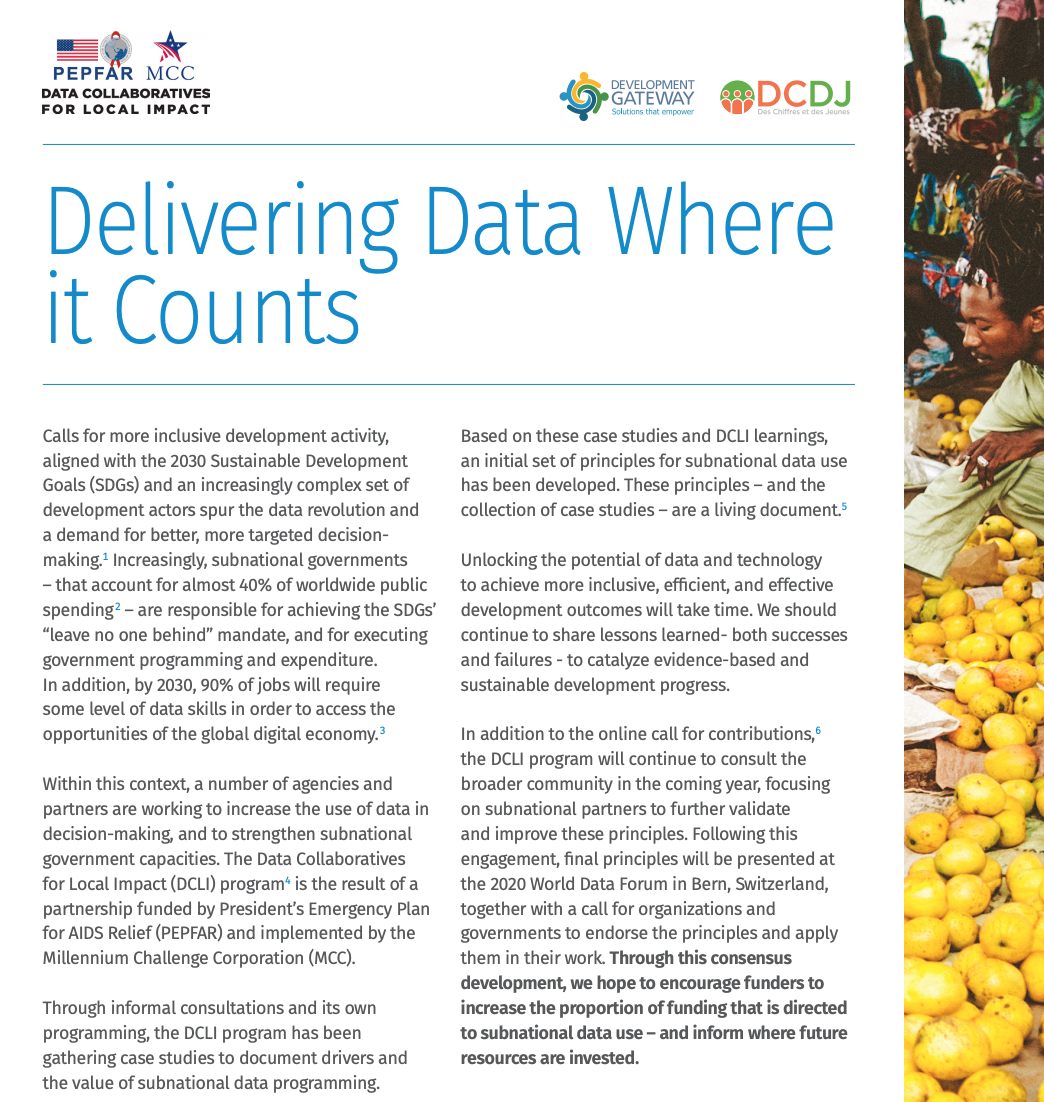Introducing the Principles for Subnational Data Use
We recently spent 3 days at the DataRev here in D.C. – learning, collaborating, and networking with colleagues around the importance of data use by country-based stakeholders to inform, drive, and measure development outcomes.
In addition to covering a number of cross-cutting themes, from business cases, to funders’ perspectives, inclusion, and data-driven innovation, the DataRev placed intentional focus on the importance of data use at the subnational level. DG led a “Tools for Subnational Data Use” roundtable and a “Measuring Sub-National Data Use” lightning talk round, as well as attended sessions focused on social investing at the local level, bridging levels to national statistical systems, and many more.
Tying these themes together and driving home the efficacy of investing in subnational data skills, we launched six Principles for Subnational Data Use at the DataRev. Colleagues shared illustrative case studies, drew important connections to the Principles for Digital Development, and led group discussions to further solidify the Principles.

Figure 1: Delivering Data Where it Counts: Introduction to the 6 Principles
We hope the Principles can serve as a resource for those seeking to increase locally-driven change. This summer, we shared the community-led, multi-step process that DG and the Data Collaboratives for Local Impact (DCLI) program are taking to shape the Principles. Looking at the Des Chiffres et Des Jeunes (DCDJ) project – implemented with local partners SEJEN, Fondation Performances Societales, and COSCI – we know that the most significant impact of subnational data is realized at community level. Local change agents like the DCDJ Fellowship graduates work to drive data use in community health programs and initiatives, and the dLab is a locally-led hive for learning, events, and youth-driven data use strengthening.
For programs like DCLI that aim to put individuals and communities in the drivers’ seat, this is both common and intentional. To capitalize on this impact, the Principles seek to identify good practices and lessons learned across DCLI and subnational programs led by many others.
Taking a case study approach, we collected stories from colleagues driving locally-driven programs – including Cooper/Smith, Global Integrity, IREX, John Snow, Inc., PATH, Results for Development, and the Open Institute. In June, we gathered to share “Delivering Data Where it Counts: Considerations for Subnational Programming,” and bridge the gap between identified themes and solid principles. In the months since, we’ve held an Open Call for feedback and additional case studies. Upon gathering this feedback and testing further considerations, we launched an expanded “Delivering Data Where it Counts” at the DataRev – as well as shared the Principles.
Collaborating to develop the Principles enables us to learn. Just as we prioritize iterative, adaptive development in technical development tools, we’ve done so throughout this process. With colleagues at the DataRev, we validated that our approach works – the Principles are strong, and on-the-ground experience suggests that some programs need to shift focus to subnational areas and leaders.

Figure 2: Launching the Principles for Subnational Data Use at the DataRev, with colleagues from JSI Health, Global Integrity, DIAL, IREX, and DG/DCDJ.
The Principles are a living document, and we’ll continue to validate them until their global launch at the 2020 World Data Forum in Bern, Switzerland. This month, DCDJ is hosting an event at the Francophone Open Data Conference (CAFDO), where we’ll spark conversation around the Principles with colleagues in Abidjan. We’ll also continue to work with the Digital Impact Alliance (DIAL) team to share best practices and ensure our work complements the Principles for Digital Development.
In the meantime, we welcome further feedback on the Principles from the global community. We invite you to take a critical eye to each one, as we seek agreement on what makes an effective subnational data activity, and inform where funds and time should be invested.
_______________
Data Collaboratives for Local Impact (DCLI), the programmatic engine behind DataRev, is a partnership between the Millennium Challenge Corporation (MCC) and the President’s Emergency Plan for Aids Relief (PEPFAR), to empower communities, individuals, and governments in Sub-Saharan Africa to use data to improve lives. DG is a DCLI partner through the Des Chiffres et Des Jeunes (DCDJ) program.
DG, MCC, and DCLI prioritize country ownership, with countries taking the lead and engaging with funders as partners and investors. This is effective for community-level change: themselves acknowledging local challenges, defining priorities, and identifying solutions.

Share This Post
Related from our library

The Cancer-Tobacco Link: Using Data to Drive Stronger Tobacco Control Policies
As we observe World Cancer Day today, it is crucial to recognize the significant role smoking plays in the global cancer epidemic. Tobacco use is the leading preventable cause of cancer and cancer-related deaths worldwide, necessitating a dynamic, multidisciplinary approach to tobacco control interventions. DG’s Tobacco Control Data Initiative (TCDI) contains country-specific websites designed to

How Useful Is AI for Development? Three Key Lessons
The development world is buzzing with excitement over the idea that new and emerging applications of AI can supercharge economic growth, accelerate climate change mitigation, reduce inequalities, and more. But what does this look like in real life?

The Future of Technology Governance and Global Development: Why DG Brought DataReady In-house
DG is excited to announce we now have more robust data governance advisory services with the recent integration of DataReady.